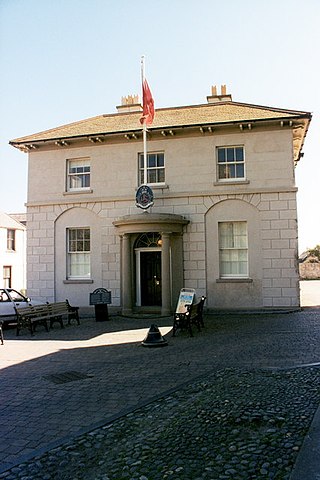
The Isle of Man had become separated from Great Britain and Ireland by 6500 BC. It appears that colonisation took place by sea sometime during the Mesolithic era. The island has been visited by various raiders and trading peoples over the years. After being settled by people from Ireland in the first millennium AD, the Isle of Man was converted to Christianity and then suffered raids by Vikings from Norway. After becoming subject to Norwegian suzerainty as part of the Kingdom of Mann and the Isles, the Isle of Man later became a possession of the Scottish and then the English crowns.

The government of the Isle of Man is a parliamentary representative democracy. The Monarch of the United Kingdom is also the head of state of the Isle of Man, and generally referred to as "The King, Lord of Mann". Legislation of the Isle of Man defines "the Crown in right of the Isle of Man" as separate from the "Crown in right of the United Kingdom". His representative on the island is the Lieutenant Governor of the Isle of Man, but his role is mostly ceremonial, though he does have the power to grant Royal Assent.
Separation of powers refers to the division of a state's government into "branches", each with separate, independent powers and responsibilities, so that the powers of one branch are not in conflict with those of the other branches. The typical division into three branches of government, sometimes called the trias politica model, includes a legislature, an executive, and a judiciary. It can be contrasted with the fusion of powers in parliamentary and semi-presidential systems where there can be overlap in membership and functions between different branches, especially the executive and legislative. In most non-authoritarian jurisdictions, however, the judiciary almost never overlaps with the other branches, whether powers in the jurisdiction are separated or fused.
An alderman is a member of a municipal assembly or council in many jurisdictions founded upon English law. The term may be titular, denoting a high-ranking member of a borough or county council, a council member chosen by the elected members themselves rather than by popular vote, or a council member elected by voters.

The Constitution of the Year III was the constitution of the French First Republic that established the Executive Directory. Adopted by the convention on 5 Fructidor Year III and approved by plebiscite on 6 September. Its preamble is the Declaration of the Rights and Duties of Man and of the Citizen of 1795.
The Union Council of Ministers is the principal executive organ of the Government of India, which functions as the senior decision making body of the executive branch. It is chaired by the prime minister and consists of the heads of each of the executive government ministries. Currently, the council is headed by prime minister Narendra Modi and consists of 29 members, including the prime minister. The council is subject to the Parliament of India.

The Chief Minister is the executive head of the Isle of Man Government.

The chairperson, also chairman, chairwoman or chair, is the presiding officer of an organized group such as a board, committee, or deliberative assembly. The person holding the office, who is typically elected or appointed by members of the group, presides over meetings of the group, and conducts the group's business in an orderly fashion.

The Council of Ministers is the principal executive organ of the Isle of Man Government. Its role is similar to, though not identical with, that of the Cabinet in the United Kingdom. Until 1990, its title was the Executive Council.

The Isle of Man Government is the government of the Isle of Man. The formal head of the Isle of Man Government is the Lieutenant Governor, the personal representative of Charles III. The executive head is the Chief Minister.
An executive council is a constitutional organ found in a number of Commonwealth countries, where it exercises executive power and (notionally) advises the governor, governor-general, or lieutenant governor, and will typically enact decisions through an Order in Council. In several Commonwealth countries, the executive council is usually referred to as the cabinet. However, the use of the word cabinet as a synonym for the executive council is not universally practised throughout the Commonwealth of Nations, with some Commonwealth countries using the term cabinet to refer to a distinct group of high-ranking officials.
The Government of the Macau Special Administrative Region, are headed by secretariats or commissioners and report directly to the chief executive. The affairs of the government are decided by secretaries, who are appointed by the chief executive and endorsed by the State Council of the Central People's Government in Beijing. As a special administrative region of China, Macau has a high degree of autonomy, in light of the "One Country, Two Systems" policy. The Macau Government, financially independent from the Central People's Government, oversees the affairs of Macau.

The League of Social Democrats (LSD) is a social democratic party in Hong Kong. Chaired by Chan Po-ying, wife of Leung Kwok-hung, it positions itself as the radical wing of the pro-democracy camp and stresses on "street actions" and "parliamentary struggles". It currently holds two seats in the District Councils.

The colonial Governors of Fiji relied on the Executive Council for advice on proposals for legislation which, after being discussed in the Executive Council meetings, came before the Legislative Council in the form of bills. In this way, the Executive Council was the chief policy-making body and performed cabinet-like functions, but being advisory, was not yet a cabinet in function. This role changed in 1964 with the introduction of the membership system.
In Sri Lanka, the Cabinet of Ministers is the council of ministers that form the central government of Sri Lanka. The body of senior ministers responsible and answerable to the Parliament of Sri Lanka. The President is a member of the cabinet and its head.

The Leader of the Seanad is a member of Seanad Éireann appointed by the Taoiseach to direct government business. Since December 2022, the incumbent is Lisa Chambers of Fianna Fáil. The Deputy leader of the Seanad is Regina Doherty of Fine Gael.

Khaldoon Khalifa Al Mubarak is an Emirati Government official and business leader. Al Mubarak holds senior positions within the Government of Abu Dhabi, including as: a member of the Executive Council since 2006, a member of the Supreme Council for Financial and Economic Affairs, and as the founding chairman of the Executive Affairs Authority. He also fulfills responsibilities for the UAE Federal government and has served as Presidential Special Envoy to the People's Republic of China since 2018.

Daniel Webster Council is a division of the Boy Scouts of America that serves all of New Hampshire.
The Executive Council of Ceylon was the Executive Council created in Ceylon by the British colonial administration on the recommendations of the Colebrooke-Cameron Commission along with the Legislative Council of Ceylon in March 1833.









